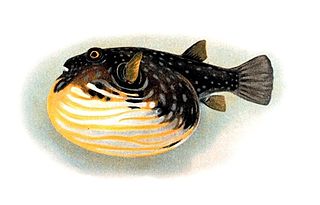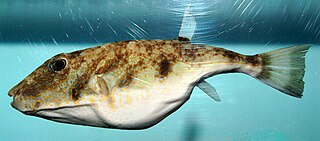
Tetraodontidae is a family of primarily marine and estuarine fish of the order Tetraodontiformes. The family includes many familiar species variously called pufferfish, puffers, balloonfish, blowfish, blowers, blowies, bubblefish, globefish, swellfish, toadfish, toadies, toadle, honey toads, sugar toads, and sea squab. They are morphologically similar to the closely related porcupinefish, which have large external spines. The scientific name refers to the four large teeth, fused into an upper and lower plate, which are used for crushing the hard shells of crustaceans and mollusks, their natural prey.

Sphoeroides is a genus of pufferfishes.

The blunthead puffer, Sphoeroides pachygaster, is a pufferfish of the family Tetraodontidae, found circumglobally in tropical and temperate seas, at depths between 50 and 500 m. First recorded in the Mediterranean Sea off the Spanish coast in 1981, after entry via the strait of Gibraltar, it invaded the western basin in following decades and now reaches eastward the Adriatic Sea, the Aegean Sea and Levantine waters. Its length is up to 40 cm. It is an edible species, and is commonly eaten in Japan, where it is referred to as 'yorito fugu', and has a lower concentration of tetrodotoxin compared to other species of pufferfish prepared and eaten as fugu, but caution is needed as its liver contains dangerous levels of the toxin, and must not be eaten.

The bandtail puffer is a species in the family Tetraodontidae, or pufferfishes. It can grow to a length of about 30 cm and is common in the Caribbean and observed from Massachusetts, USA in the north to Santa Catarina, Brazil in the south.
The speckled puffer, Sphoeroides yergeri, is a species in the family Tetraodontidae, or pufferfishes. It is found in the Caribbean Sea.

The checkered puffer is a species in the family Tetraodontidae, or pufferfishes.
Sphoeroides trichocephalus, the pygmy puffer, is a species of marine pufferfish native to the Central American coast of the Pacific Ocean, and can be found from La Serena, Chile to San Carlos, Mexico. S. trichocephalus are a demersal species, commonly found on soft substrates in shallow bays and coves at depths between 1–10 m (3.3–32.8 ft). This species grows to a maximum total length (TL) of 10.5 cm (4.1 in). They are not widely utilized by humans but may be found in markets sold as a food fish. They are likely taken as bycatch in trawl fisheries and discarded.
Peruvian puffer, Sphoeroides sechurae, is a species in the family Tetraodontidae, or pufferfishes. It is found in the eastern Pacific Ocean.

Least puffer, Sphoeroides parvus, is a species in the family Tetraodontidae, or pufferfishes. This species is the common bay and inshore puffer for the waters around Texas and Louisiana. It has also been found as far east as Apalachicola Bay and south to Yucatán. Mature least puffers are small, usually less than four inches (100 mm).
Sphoeroides nitidus is a species in the family Tetraodontidae, the pufferfishes. It is native to the Southwest Pacific, where it is known from New Zealand.

The southern puffer is a species of pufferfish in the family Tetraodontidae. It is found in the Caribbean Sea, and possibly further south on the coast of Brazil.

The Guinean puffer, Sphoeroides marmoratus, is a species of the family Tetraodontidae, or pufferfishes. Found in the eastern Atlantic from Portugal to Angola, including Madeira, the Azores, Cape Verde and the Canary Islands, it has been recently recorded on rare, distinct occasions in the Alboran Sea, western Mediterranean Sea.

The northern puffer, Sphoeroides maculatus, is a species in the family Tetraodontidae, or pufferfishes, found along the Atlantic coast of North America. Unlike many other pufferfish species, the flesh of the northern puffer is not poisonous, although its viscera can contain poison, and high concentrations of toxins have been observed in the skin of Floridian populations. They are commonly called sugar toads in the Chesapeake Bay region, where they are eaten as a delicacy. There was widespread consumption of northern puffers during the rationing that accompanied the Second World War, establishing a commercial fishery that reached its zenith in the 1960s. In much of the Northeast, the fish is known simply as "blowfish" or "chicken of the sea". They may also be sold as "sea squab".

Sphoeroides annulatus is a species in the family Tetraodontidae, or pufferfishes. It is found in the eastern Pacific Ocean from California, USA to Pisco, Peru and the Galápagos Islands.
Sphoeroides greeleyi is a fish species described by Charles Henry Gilbert in 1900. Sphoeroides greeleyi is part of the genus Sphoeroides and the pufferfish family Tetraodontidae. No subspecies are listed in the Catalog of Life.
Sphoeroides andersonianus is a species of pufferfish in the family Tetraodontidae. It is a tropical marine species native to the Eastern Pacific. FishBase notes that a better reference is needed to determine additional information on the species.
Sphoeroides angusticeps, known as the narrow-headed puffer, is a species of pufferfish in the family Tetraodontidae. It is a tropical marine species endemic to the Gálapagos Islands, where it occurs at a depth range of 5 to 18 m. It reaches 25 cm in total length. The species is thought to be diurnal, hovering just above the substrate by day and burying itself at night.

Sphoeroides dorsalis, known as the marbled puffer, is a species of pufferfish in the family Tetraodontidae. It is native to the Western Atlantic, where it ranges from North Carolina to Suriname and occurs at a depth of 18 to 100 m. It is a demersal oviparous species found over soft bottoms that reaches 20 cm in total length.
Sphoeroides georgemilleri, known as the plaincheek puffer, is a species of pufferfish in the family Tetraodontidae. It is known only from the Caribbean Sea off of Colombia, where it occurs at a depth range of 1 to 151 m and is demersal, inhabiting soft bottoms. It is known to reach at least 12 cm in length.
The Brazilian puffer(Sphoeroides camila) is a species of pufferfish native to the Brazil. Previously thought to be the bandtail puffer (Sphoeroides spengleri), the species was discovered through DNA analysis. The fish lives in the western Atlantic from northern to southeastern Brazil, and some may be found in the southern Caribbean.









